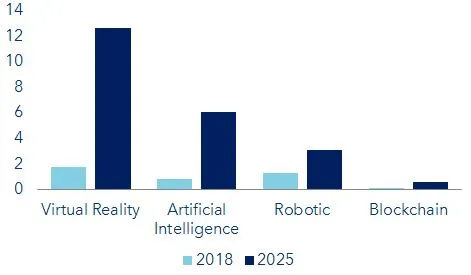Digitale Transformation in Education - «Alexa: Make me smart»
Digital transformation in education is usually considered to be synonymous with “e-learning”. Although electronic learning platforms are the basis for modern education, the technological progress spans the entire value chain, from learning management systems (LMS), digital classrooms and online courses, to embedding learning measures in the ongoing work process. As of 2025, it is estimated that the global revenues from learning technologies and digital learning methods will amount to some USD 342 bn, which corresponds to roughly 4% of the world’s total outlays for education.
Introducing digital learning methods is much easier in less regulated educational systems, as evidenced by Brazil’s Arcos Platform Technology. The company developed an independent online learning platform and, with the acquisition of Sistema Positivo de Ensino, has become one of Brazil's largest content providers for private students at the primary and secondary education level. With over 4,800 partner schools, the company reaches more than 1.2 million students. Education has also become a rapidly growing market in China. An approximately CNY 100 billion (USD 14 billion) are spent on digitised tutoring and exam preparation, and this figure is expected to rise to CNY 310 billion (ca. USD 42 billion) by 2022. In terms of total revenue, Koolearn Technology is the largest provider of online training in China and should profit disproportionately from this growth trend.
This is the first episode of our series «Digital transformation - The path to the future». The series draws on five drivers to explain how digitalisation is changing business models and how investors can benefit from this evolution. Find the introduction and the overview to the series here.
While the focus in emerging markets is on private schools, this segment is already highly competitive in the USA. The biggest growth potential for digitalisation is therefore seen in the public and non-profit schooling sectors. For the London-listed Pearson, which operates worldwide, the USA is its largest market. With a market volume of USD 5.6 bn expected by 2024, the growth prospects there are also rosy. Pearson currently has a total of 125 million registered course participants worldwide.
Technology Expenditure in education (in bn USD)

Recent advances in digital technologies – e.g. virtual reality or the three- and four-dimensional design of artificial environments – are generating a new and important dy-namic in the education sector. In terms of US companies alone, the eLearning Industry network found that over 77% of them were already using digital learning technolo-gies in 2017.
Not just the increased flexibility, cost savings for everyone involved, fast and fully mobile access to the learning environment, but also the better learning results are the drivers of growth in the education segment. But it is important that the learning is integrated directly into the trainee’s work processes or living environment. The traditional classroom has taken a back seat. Learning is becoming more personalised and attuned to the individual’s knowledge level, skills and training needs. Mandatory continuing education is also becoming more efficient and targeted.
If the effort is worth it, it will be done
State educational institutions continue to be run hierarchically and adhere to the learning path prescribed back in the early days of industrialisation. In contrast, initial and continuing vocational training at companies is often viewed as a cost factor rather than an integral part of human resource management. But a number of findings from the USA reveal just how important digital learning measures are for companies. At four out of ten US enterprises, the use of e-learning has led to a significant increase in earnings. Per-employee profitability tripled, and profit margins increased by an average of 25%.
In the USA, Instructure is trying to take e-learning to an entirely new level. The company aims to provide learning tools from day one of school to the last work day before retirement. A cloudbased learning management platform is used to this end. The technology enables users to move across a wide range of environments, operating systems, devices and locations so that all stakeholders – students, teachers, employees and businesses alike – achieve their learning and education goals.
For companies, the economic benefits are to be found in a combination of efficiency enhancements and lower costs. The growth of digital learning technologies is particularly high in less regulated and more populous emerging countries. With over 3,000 socalled “EdTech” companies, i.e. companies offering digital learning techniques, Beijing is the global champion in this regard, followed by San Francisco and New York. Many of these companies are not listed on exchanges. They focus on classic online learning but are also engaged in virtual reality and artificial intelligence applications. Although digital transformation increases companies’ work efficiency and their attractiveness as an employer, students at universities benefit as well. In the USA, 60% of all students take on heavy debt to pay for their studies. Slightly more than 44 million people are directly or indirectly indebted to the US-state for a total of USD 1.5 trillion in student loans. A structural reduction of costs would ease this burden and open the door to higher education for a broader public.
Digitalisation of the education system leads directly to a democratisation of knowledge and ultimately to a similarly high quality of learning across the globe. If one also considers the daunting demographic developments in the emerging countries, the tremendous future value potential of digitalisation becomes clear.
Summary
Education can heighten prosperity, both for the individual and for society as a whole. Young people are recognised as a driving force because today they grow up in parallel with technological advancements. However, learning accompanies us for the entire life. New digital technologies intensify the direct and individualised access to knowledge and its application. For the first time in history, learning is independent of regional conditions and class. Digitalisation and education represent a perfect combination for the future.
Please get in touch with your personal contact at VP Bank for Investment Ideas.
Content responsibility
Bernd Hartmann, Head of Group Investment Research
Harald Brandl, Senior Equity Strategist
Marcello Musio, Senior Equity Analyst
Esther Rietzler, Senior Investment Manager
Important legal information
This document was produced by VP Bank AG (hereinafter: the Bank) and distributed by the companies of VP Bank Group. This document does not constitute an offer or an invitation to buy or sell financial instruments. The recommendations, assessments and statements it contains represent the personal opinions of the VP Bank AG analyst concerned as at the publication date stated in the document and may be changed at any time without advance notice. This document is based on information derived from sources that are believed to be reliable. Although the utmost care has been taken in producing this document and the assessments it contains, no warranty or guarantee can be given that its contents are entirely accurate and complete. In particular, the information in this document may not include all relevant information regarding the financial instruments referred to herein or their issuers.
Additional important information on the risks associated with the financial instruments described in this document, on the characteristics of VP Bank Group, on the treatment of conflicts of interest in connection with these financial instruments and on the distribution of this document can be found at https://www.vpbank.com/Disclaimer_en.pdf


